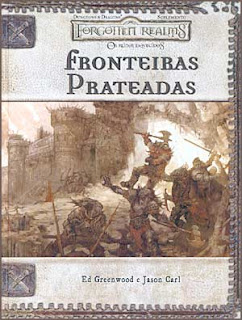Forgotten Realms não tem "o autor" e sim "um número excessivamente e colossalmente grande de autores".
Uma das maiores bençãos e a maior fonte de incongruências do cenário é justamente essa: Ed Greenwood nunca pode exercer muito controle sobre Forgotten Realms do que, por exemplo, Keith Baker tem sob Eberron ( não que Baker controle Eberron, mas sabe-se lá como ele evitou diversas mudanças serem colocadas em Eberron, como o "Time Slip" de 2 anos e um avanço em direção a uma "New War" ) ou Troy Denning exerceu em Athas ( incluindo a horrenda Prism Pentad ). E o sucesso de novels como as de R.A. Salvatore e a Time of Troubles, as maiores responsáveis pela fama de Forgotten Realms também não ajudou nenhum pouco a manter uma visão "unitária" de Forgotten Realms.
E já que você citou a Old Grey Box, um exemplo de como Forgotten Realms passou por isso. Originalmente, essa era a descrição de Unther, Mulhorand e Chessenta ( Babilônia, Egito e "Grécia' ):
THE SOUTH
At a glance: The common reference to the South (also the grim and magical South) refers to the lands of Chessenta,Unther, and Mulhorand, which are among the first and eldest nations in this land.
Elminster Notes: The South is often invoked when explaining some unknown event, such as a freak windstorm on the Inner Sea being damned Southern magics. The nations of the South are older than any other human domains in the realms. It is viewed by those of the north as an area of strange,
exotic ways, age-old decadence, and cruelty and slavery, with strange gods, outrageous customs, and no law save that of the sword.
The South is also known for strong magic, and many wondrous devices and artifacts find their origin there. Southern traders are sometimes found
in the seaports of the North, trading spices, rich cloth, wine, and brass ornaments to trade for trained war mounts, parchment, glass, worked steel, and
woodwork.
Men of the South commonly have up to three blue circles painted on their foreheads. These circles generally mean the man is skilled and learned,
and can write and knows magic, is conversant with religious history and rituals, or is aware of law and folklore of his native region. In general, most southerners are treated as magic-users or the spawn of magic-users, and given a wide berth.E o que se sabia sobre tais nações? Bem, Chessenta era um terra de beberrões malucos e tinha um governante incrivelmente rico. Sobre Unther e Mulhorand, que havia desertos por lá , que Unther e Mulhorand eram governadas por reis e rainhas imortais e isso:
Some have crossed through the border walls into Thay as well as into Unther, a desert land that lies south and west of Mulhorand. Tholaunt, Divine Precept of Mulhorand (one of the god-kings of Mulhorand) says the coming of the Statues to life is not his doing nor that of any of his family, as far as he can tell, and adds that the power of control the Statues is not known to his family. Some have whispered of strife within his family, though, and say that the Statues may be under the control of another.Yep, nada de "Pseudo-Nações". Eram basicamente locais desconhecidos incrivelmente mágicos com Reis-Magos-Divinos, um dos tropes mais antigos de fantasia.
Como eles passaram a ser o que o são hoje? Agradeça a Old Empires, um livro de Scott Benie lançado em 1989 ( é o décimo da
Forgotten Realms Series, que diga-se de passagem é ótima). E no caso dos outros "Pseudos": Well, todos os "Continentes Extras" tem uma história de "Executive Meddling", de Kara-Tur ( originalmente seria de Greyhawk, mas o cenário já estava decadente e FR era a nova estrela dos ovos de ouro ) a Maztica e Zakhara.
Não sei aonde quer chegar, mas lá vai..
Apenas queria me certificar que estava lidando com alguém que conhece o mínimo de Forgotten Realms - eu já tive a infelicidade de conhecer uma boa soma de pessoas que critivavam Forgotten Realms sem conhecê-lo e apenas queria me certificar que você não é um deles.
Alguem aqui conhece? O mundo era mais coeso/menos estapafúrdio? Havia mais lugares vazios no mapa onde eu podia criar meu reinozinho particular sem pisar no metaplot de algum autor? Dava aquela sensação de vastidão desconhecida esperando pra ser desbravada? (tipo a 1ª ed de Dark Sun? )
Eu tenho a Old Grey Box ( ou o que restou dela, eu só consegui comprar uma depois de já ter a Box de AD&D 2e ). E a resposta para todas suas perguntas é: Sim. E tem uma das maiores virtudes que me atrai em livros do Ed Greenwood: muito do que aparece no livro está na forma de um personagem ( Elminster ) descrevendo o que ele conhece sobre os Reinos ( assim como o "Wanderer" de Athas, Volo na série de livros "Volo's Guide to" e Rand no Rand's Travelogue, uma série de artigos no antigo site da Wizards ). Eu coloquei acima um exemplo de como a maioria do texto sobre a geografia e história dos Reinos ocorre ( The South ).
Agora eu pergunto: qual a causa central que explica essa miscelânea de culturas pseudo-terrestres lado-a-lado de elementos tolkienescos e cthulhescos? Qual o fator central que explica esse absurdo ? Dark Sun tem uma causa central para seus absurdos; Planescape também; Ravenloft também. Qual é a de Forgotten ?
Está bem no nome do cenário.
Eu fico realmente surpreso por que você nunca se perguntou o por que do nome "Forgotten Realms". A explicação está aqui:
According to the setting's creators, the "Forgotten Realms" is the name of an imaginary fantasy world that exists somewhere beyond the real world. The setting is described as a world of strange lands, dangerous creatures, and mighty deities, where magic and seemingly supernatural phenomena are quite real. The premise is that, long ago, the Earth and the world of the Forgotten Realms were more closely connected. As time passed, the inhabitants of planet Earth have mostly forgotten about the existence of that other world—hence the term "Forgotten Realms". On the original Forgotten Realms logo, which was used until 2000, small runic letters read "Herein lie the lost lands", an allusion to the connection between the two worlds....
Greenwood noted that TSR altered his original conception of the Realms being a place that we could travel to from our world, "Concerns over possible lawsuits (kids getting hurt while trying to 'find a gate') led TSR to de-emphasize this meaning".Yep, Faerun é um "Mundo Irmão" da Terra. E esse é um trope também consideravelmente antigo, que data no mínimo de Howard e sua Era Hiboriana.
"Eu não sou católica, mas considero os princípios cristãos - que tem suas raízes no pensamento grego e que, no transcorrer dos séculos, alimentaram todas as nossas civilizações européias - como algo que uma pessoa não pode renunciar sem se aviltar" Simone Weil
When you decide to grant power to government, start by thinking "What powers would I allow the government to have over me if I knew that my worst enemy in the world was going to be in charge of this government?" - Hastings & Rosenberg.















 )
)
 ) é que ele cortou muito dos exageros, viagens e loucuras que Forgotten Realms passou durante a AD&D Era - o que inclui a idéia de "Planeta Irmão da Terra", "Spelljammer", "Renascimento Medieval-Mágico" ( o começo da "2e Era" tinha desde difusão de armas de fogo a um gnomo chamado "DaRoni" - não, eu não estou mentindo nessa parte, mas queria estar
) é que ele cortou muito dos exageros, viagens e loucuras que Forgotten Realms passou durante a AD&D Era - o que inclui a idéia de "Planeta Irmão da Terra", "Spelljammer", "Renascimento Medieval-Mágico" ( o começo da "2e Era" tinha desde difusão de armas de fogo a um gnomo chamado "DaRoni" - não, eu não estou mentindo nessa parte, mas queria estar